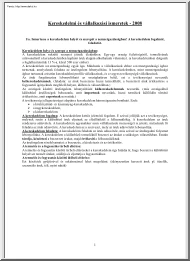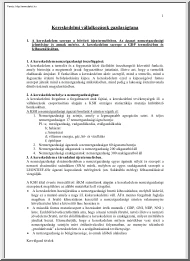Alapadatok
Év, oldalszám:2021, 8 oldal
Nyelv:angol
Letöltések száma:3
Feltöltve:2021. június 21.
Méret:938 KB
Intézmény:
-
Megjegyzés:
Csatolmány:-
Letöltés PDF-ben:Kérlek jelentkezz be!
Értékelések
Nincs még értékelés. Legyél Te az első!Legnépszerűbb doksik ebben a kategóriában
Tartalmi kivonat
THE MILLENNIALS GUIDE TO BUYING YOUR FIRST HOME Lifetime Market Insight 1 Lifetime Market Insight 1 THE FIRST STEP TOWARDS YOUR FIRST HOME There is so much opinion and information about how, when and what to buy, it can seem like an overwhelming process for first homebuyers – especially for those in their 20s and early 30s – the so-called millennial generation of those born since 1982. Lifetime Mortgage and Financial Adviser Michael Karabassis and Cameron & Co Solicitor Josh Morgan are themselves part of this generation and have come together to help their fellow millennials secure a mortgage and buy their first home. Having an ongoing conversation is important. It’s never about favouring one bank or one solution. Michael Karabassis Mortgage & Financial Adviser, Lifetime 2 Lifetime Market Insight 2 THE CHRISTCHURCH MARKET EXISTING PROPERTY OR NEW BUILD? Homeownership and property investment remains high on the priority list for Cantabrians, says Mortgage
and Financial Adviser Michael Karabassis. Christchurch is almost nearing an oversupply with increased development of subdivisions and apartments, and the region is unlikely to see a shortage as it continues to expand geographically. Although the value of the property won’t increase as quickly, you can often build a new home cheaper than buying an existing one of the same standard and specifications,” Karabassis says. “However, while there might be many on the market, there is a limited supply of good properties,” Karabassis says. “Currently there’s a unique desire for these earthquake-damaged as-is-where-is properties, and those buyers are joined by other property hunters looking for the doer-upper dream.” In his experience, younger people with time and energy are focusing on renovations and building equity in a property, but for those who don’t want to do it themselves or have a young family, building is proving the best option. Before starting the process of buying
your first home, Karabassis and Cameron and Co solicitor Josh Morgan advise seeking guidance from the professionals. “The whole process is easier if you have clear advice from the start,” Morgan says. Financial advisers can help you to be prepared financially, while lawyers can guide you on the necessary safeguards to deal with appropriate conditions, advising on the type of conditions you might encounter and consider when reaching the agreement stage. “In Christchurch, there’s an extra layer of complication as home buyers have to be very clear about the conditions surrounding EQC and private insurance claims. It’s so important to know the history of the home,” Morgan says. Both EQC and private insurance claims can either be cash settled or paid out directly to contractors who arrange the repairs. Either way, it’s important to establish whether the repairs have been done, and if so, that they’ve been done to the appropriate standard. “A solicitor can help people
establish what claims were made against a property, and importantly, how the claim was settled,” Morgan says. 3 Lifetime Market Insight 3 STEP BY STEP WITH MICHAEL KARABASSIS AND JOSH MORGAN DEPOSIT GUARANTEE You need to know all the ways in which you can come by the initial deposit for your property. While some properties require 20 to 40 per cent deposit, a turn-key property – whereby buyers purchase properties from the plan – only requires 5 per cent and a new build 10 per cent. A parent or guardian can also guarantee the mortgage with their own home or income. This type of arrangement means everyone needs to be loaning from the same bank, which can limit options in terms of the best solution. However, the guarantor always has the option to change banks, too. It’s often the case that parents are topping up the mortgage on their own home, and their children are paying the extra. CASH This could be your own savings, saved from your income over time or a loan from a
friend or family member. KIWISAVER Individual homebuyers that have been in KiwiSaver for three, four or five years respectively can receive a one-off HomeStart grant of $3,000, $4,000 or $5,000. For a turnkey home and land package, the HomeStart grant is $2,000 for each year of KiwiSaver contribution. So for three, four and five years of contribution, members can respectively get $6,000, $8,000 or $10,000. GIFT Parents and family members in the right financial position are gifting cash to kick-start first home buyers’ mortgages. A cash gift means the new mortgage can be gained with whichever lender is providing the best deal. 4 MORGAN’S LEGAL TIP If there is more than one party contributing to the deposit, it’s important they seek legal advice to secure their position or stake within the property. In a relationship, it’s often the case that both sides will bring varying funds or KiwiSaver contributions to the deposit. In this case they need to consider a relationship
property agreement to confirm that, if they part ways, they will leave with their initial contribution. Where parents are supporting their child, they might want to see what implications it has for their situation and whether a propertysharing agreement, or other legal tool between themselves and their child, is appropriate. Lifetime Market Insight 4 SERVICING APPLICATION When assessing what kind of loan homebuyers need, start by looking at income and current debt. Usually there are no issues with having other loans or existing debts as long as you can afford to pay them all. An adviser can usually work out what kind of loan you require (and how much you can afford) reasonably quickly. Then it comes to the application stage. However, a small tidy up of your current financial situation can make you more appealing to lenders. Remember that cars, dependents, personal loans and credit card limits (despite whether you use them or not) are considered negatives. 1 Deposit 2 Cash
Usually the first option is the main banks (first-tier lenders), but for anything outside of the box, other lenders might be best. In Christchurch, people turn to third-tier lenders when they need money instantly, particularly when buying an as-is-where-is property when they’ve gone unconditional and the settlement is within a few days. Third-tier lenders can give up to 100% of the loan, but there are usually large fees attached. 3 KiwiSaver GOING UNCONDITIONAL 4 Gift 5 Guarantee 6 Servicing Once the bank receives the results, buyers enter a “conditional” period. Essentially this means pre-approval as the bank waits for applicants to meet lending conditions. 7 Application 8 Going Unconditional 9 Post-Purchase STEP BY STEP See our Home Loans Guide for more info on the process and choices. 5 Depending on your financial situation, we’ll approach first tier (main banks), second tier (smaller banks not governed by the Reserve Bank) or third tier lenders. At
this point, if you’ve teamed up with an adviser, all the final application and KiwiSaver fund applications are taken care of and the home loan goes unconditional. This is a great time to think about your repayments – just one small increase in these (through some simple budgeting techniques) could decrease your payment period by up to two years. Lifetime Market Insight 5 MORGAN’S LEGAL PROCESS People use a solicitor when their finance is pre-approved but not necessarily unconditional because their finance applications will be subject to the bank approving the property. Firstly, it’s important to confirm how the property is being sold. If it’s by auction, the due diligence needs to be done before the bidding; this includes arranging finance, insurance and a builder’s report, together with reviewing the Land Information Memorandum (the LIM), title and EQC/private insurance information. In this case, a real estate agent will provide you with a contract. For a deadline
sale, the contract has already been prepared by the real estate agent/seller’s solicitor and you still must have your solicitor look over the conditions and reports. When clients are purchasing a private sale, the purchaser will usually be expected to prepare the agreement. Once the agreement is signed, your solicitor will help you work through the conditions of the agreement. Once the agreement is unconditional, your solicitor will work to complete the settlement including the transfer of title and registration of mortgage. Your solicitor will also advise the local authority of the change of ownership and arrange the changeover of rates charges between the buyer and seller. It usually takes around 10 working days to tackle the conditions of the agreement and a further month from the moment the contract is signed to reach settlement with regards to KiwiSaver, the bank, insurers and Housing New Zealand. While the solicitor will work on preparing statements and liaising with the
council, bank and EQC, the new homebuyer will receive the keys to their property on the settlement date. 6 Josh Morgan Solicitor, Cameron & Co Lifetime Market Insight 6 POST-PURCHASE OPTIONS In the initial meeting I ask people about their five-year goals and payment strategy. Once their home is secured and the mortgage loan application is done and dusted, we then talk about how repayments will be made. If a fixed rate has been picked, we’ll often talk every time the renewal comes up, but if it’s a floating or revolving loan, having an ongoing conversation is important. It’s never about favouring one bank or one solution. In many cases, people are able to address their mortgage by investing in another property. ABOUT LIFETIME Lifetime is a full-service financial advisory practice committed to securing a smarter financial future for Kiwis. From humble beginnings in 1999 as a small South Island business, we’ve grown to become a nationwide company of highly experienced
financial, business and insurance advisers. If you’d like to learn more about obtaining a first home loan or any other of our financial services, visit www.lifetimeconz The principle is to buy low, create value, and then use the equity as the deposit for the next house. Sometimes little work needs to be done on the property to increase the value and, in theory; you should be able to pull equity out of a property every three to six months. REMEMBER Some financial advisers offer free services to clients and have access to a range of financial solutions. Engaging a solicitor from the start prevents delays and problems with contract conditions and is ultimately the most cost-effective solution. The price range for the whole service is usually $1,500-$1,700 plus GST and disbursement. 7 Lifetime Market Insight 7 Lifetime Market Insight 8
and Financial Adviser Michael Karabassis. Christchurch is almost nearing an oversupply with increased development of subdivisions and apartments, and the region is unlikely to see a shortage as it continues to expand geographically. Although the value of the property won’t increase as quickly, you can often build a new home cheaper than buying an existing one of the same standard and specifications,” Karabassis says. “However, while there might be many on the market, there is a limited supply of good properties,” Karabassis says. “Currently there’s a unique desire for these earthquake-damaged as-is-where-is properties, and those buyers are joined by other property hunters looking for the doer-upper dream.” In his experience, younger people with time and energy are focusing on renovations and building equity in a property, but for those who don’t want to do it themselves or have a young family, building is proving the best option. Before starting the process of buying
your first home, Karabassis and Cameron and Co solicitor Josh Morgan advise seeking guidance from the professionals. “The whole process is easier if you have clear advice from the start,” Morgan says. Financial advisers can help you to be prepared financially, while lawyers can guide you on the necessary safeguards to deal with appropriate conditions, advising on the type of conditions you might encounter and consider when reaching the agreement stage. “In Christchurch, there’s an extra layer of complication as home buyers have to be very clear about the conditions surrounding EQC and private insurance claims. It’s so important to know the history of the home,” Morgan says. Both EQC and private insurance claims can either be cash settled or paid out directly to contractors who arrange the repairs. Either way, it’s important to establish whether the repairs have been done, and if so, that they’ve been done to the appropriate standard. “A solicitor can help people
establish what claims were made against a property, and importantly, how the claim was settled,” Morgan says. 3 Lifetime Market Insight 3 STEP BY STEP WITH MICHAEL KARABASSIS AND JOSH MORGAN DEPOSIT GUARANTEE You need to know all the ways in which you can come by the initial deposit for your property. While some properties require 20 to 40 per cent deposit, a turn-key property – whereby buyers purchase properties from the plan – only requires 5 per cent and a new build 10 per cent. A parent or guardian can also guarantee the mortgage with their own home or income. This type of arrangement means everyone needs to be loaning from the same bank, which can limit options in terms of the best solution. However, the guarantor always has the option to change banks, too. It’s often the case that parents are topping up the mortgage on their own home, and their children are paying the extra. CASH This could be your own savings, saved from your income over time or a loan from a
friend or family member. KIWISAVER Individual homebuyers that have been in KiwiSaver for three, four or five years respectively can receive a one-off HomeStart grant of $3,000, $4,000 or $5,000. For a turnkey home and land package, the HomeStart grant is $2,000 for each year of KiwiSaver contribution. So for three, four and five years of contribution, members can respectively get $6,000, $8,000 or $10,000. GIFT Parents and family members in the right financial position are gifting cash to kick-start first home buyers’ mortgages. A cash gift means the new mortgage can be gained with whichever lender is providing the best deal. 4 MORGAN’S LEGAL TIP If there is more than one party contributing to the deposit, it’s important they seek legal advice to secure their position or stake within the property. In a relationship, it’s often the case that both sides will bring varying funds or KiwiSaver contributions to the deposit. In this case they need to consider a relationship
property agreement to confirm that, if they part ways, they will leave with their initial contribution. Where parents are supporting their child, they might want to see what implications it has for their situation and whether a propertysharing agreement, or other legal tool between themselves and their child, is appropriate. Lifetime Market Insight 4 SERVICING APPLICATION When assessing what kind of loan homebuyers need, start by looking at income and current debt. Usually there are no issues with having other loans or existing debts as long as you can afford to pay them all. An adviser can usually work out what kind of loan you require (and how much you can afford) reasonably quickly. Then it comes to the application stage. However, a small tidy up of your current financial situation can make you more appealing to lenders. Remember that cars, dependents, personal loans and credit card limits (despite whether you use them or not) are considered negatives. 1 Deposit 2 Cash
Usually the first option is the main banks (first-tier lenders), but for anything outside of the box, other lenders might be best. In Christchurch, people turn to third-tier lenders when they need money instantly, particularly when buying an as-is-where-is property when they’ve gone unconditional and the settlement is within a few days. Third-tier lenders can give up to 100% of the loan, but there are usually large fees attached. 3 KiwiSaver GOING UNCONDITIONAL 4 Gift 5 Guarantee 6 Servicing Once the bank receives the results, buyers enter a “conditional” period. Essentially this means pre-approval as the bank waits for applicants to meet lending conditions. 7 Application 8 Going Unconditional 9 Post-Purchase STEP BY STEP See our Home Loans Guide for more info on the process and choices. 5 Depending on your financial situation, we’ll approach first tier (main banks), second tier (smaller banks not governed by the Reserve Bank) or third tier lenders. At
this point, if you’ve teamed up with an adviser, all the final application and KiwiSaver fund applications are taken care of and the home loan goes unconditional. This is a great time to think about your repayments – just one small increase in these (through some simple budgeting techniques) could decrease your payment period by up to two years. Lifetime Market Insight 5 MORGAN’S LEGAL PROCESS People use a solicitor when their finance is pre-approved but not necessarily unconditional because their finance applications will be subject to the bank approving the property. Firstly, it’s important to confirm how the property is being sold. If it’s by auction, the due diligence needs to be done before the bidding; this includes arranging finance, insurance and a builder’s report, together with reviewing the Land Information Memorandum (the LIM), title and EQC/private insurance information. In this case, a real estate agent will provide you with a contract. For a deadline
sale, the contract has already been prepared by the real estate agent/seller’s solicitor and you still must have your solicitor look over the conditions and reports. When clients are purchasing a private sale, the purchaser will usually be expected to prepare the agreement. Once the agreement is signed, your solicitor will help you work through the conditions of the agreement. Once the agreement is unconditional, your solicitor will work to complete the settlement including the transfer of title and registration of mortgage. Your solicitor will also advise the local authority of the change of ownership and arrange the changeover of rates charges between the buyer and seller. It usually takes around 10 working days to tackle the conditions of the agreement and a further month from the moment the contract is signed to reach settlement with regards to KiwiSaver, the bank, insurers and Housing New Zealand. While the solicitor will work on preparing statements and liaising with the
council, bank and EQC, the new homebuyer will receive the keys to their property on the settlement date. 6 Josh Morgan Solicitor, Cameron & Co Lifetime Market Insight 6 POST-PURCHASE OPTIONS In the initial meeting I ask people about their five-year goals and payment strategy. Once their home is secured and the mortgage loan application is done and dusted, we then talk about how repayments will be made. If a fixed rate has been picked, we’ll often talk every time the renewal comes up, but if it’s a floating or revolving loan, having an ongoing conversation is important. It’s never about favouring one bank or one solution. In many cases, people are able to address their mortgage by investing in another property. ABOUT LIFETIME Lifetime is a full-service financial advisory practice committed to securing a smarter financial future for Kiwis. From humble beginnings in 1999 as a small South Island business, we’ve grown to become a nationwide company of highly experienced
financial, business and insurance advisers. If you’d like to learn more about obtaining a first home loan or any other of our financial services, visit www.lifetimeconz The principle is to buy low, create value, and then use the equity as the deposit for the next house. Sometimes little work needs to be done on the property to increase the value and, in theory; you should be able to pull equity out of a property every three to six months. REMEMBER Some financial advisers offer free services to clients and have access to a range of financial solutions. Engaging a solicitor from the start prevents delays and problems with contract conditions and is ultimately the most cost-effective solution. The price range for the whole service is usually $1,500-$1,700 plus GST and disbursement. 7 Lifetime Market Insight 7 Lifetime Market Insight 8





 Útmutatónk teljes körűen bemutatja az angoltanulás minden fortélyát, elejétől a végéig, szinttől függetlenül. Ha elakadsz, ehhez az íráshoz bármikor fordulhatsz, biztosan segítségedre lesz. Egy a fontos: akarnod kell!
Útmutatónk teljes körűen bemutatja az angoltanulás minden fortélyát, elejétől a végéig, szinttől függetlenül. Ha elakadsz, ehhez az íráshoz bármikor fordulhatsz, biztosan segítségedre lesz. Egy a fontos: akarnod kell!